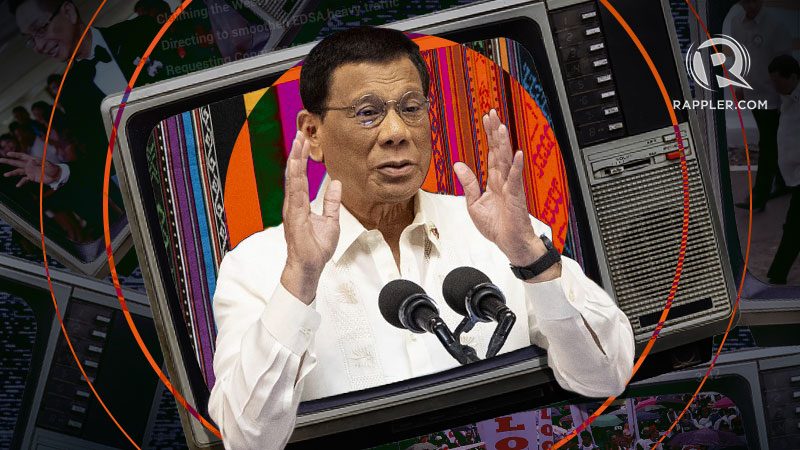SUMMARY
This is AI generated summarization, which may have errors. For context, always refer to the full article.

Last year, I reviewed President Rodrigo Duterte’s first two State of the Nation Addresses as cinematic experiences. Politics is an equal mix of substance and entertainment. In many cases, things skew towards the latter, but that’s local politics for you.
Coupled with his 3rd SONA, those addresses formed the first trilogy in the Presidential cinematic universe. That first trilogy already gave us a lot to chew on, but given the 6-year term of the president, a sequel trilogy was in order.
Last Monday’s SONA was Duterte’s first in this new series. So how did it fare compared to the previous ones?
Improved optics
Nobody really expects stunning visuals from SONAs, which are usually character- and dialogue-driven affairs. Brilliante Mendoza tried to change that when he was tapped to direct the president’s first two addresses. The results were memorable, but also slightly bewildering. Mendoza’s over-reliance on worm’s-eye angles during the first installment imbued his subject with an oppressive, authoritarian vibe, which was contrary to the everyman persona the president had been cultivating.
Joyce Bernal came onboard to direct the 3rd SONA. Known primarily for comedic works, Bernal brought a breath of freshness to the proceedings. Bernal was back to helm the most recent one.
This time, visual interest was created by hanging indigenous drapes, which were woven by local craftspeople from Marawi, on the speaker’s podium.
The more things change…
While this is the start of the sequel trilogy, we still face the same problems and conflicts introduced during the first one. The plot hasn’t really moved much since the previous seasons.
“It has been 3 years since I took my oath of office,” the president said. “And it pains me to say that we have not learned our lesson. The illegal drug problem persists. Corruption continues and emasculates the courage we need to sustain our moral recovery initiatives.”
As far as sequels go, the 2019 SONA was a bit of a rehash of previous ones. It’s great for continuity, but there wasn’t much in the way of entertainment value — unless you count presidential spokesperson Salvador Panelo’s outfit (which seemed to be made from a preschooler’s bag) or whatever this is supposed to be.
The president improvised a large number of his lines, as he is wont to do. And while he peppered his dialogue with the usual swear words and sexist jokes, there wasn’t a full-blown tirade comparable to last year’s. The 2018 SONA was partly memorable for Duterte’s profanity-laced rant against the United Nations. This year was a bit less aggro, although Duterte did encourage people to slap extortionists working in the government.
One of the more surprising scenes in the 2019 SONA was when Duterte entered the more contemplative section of his monologue. “The biggest I have met the enemy face-to-face and sadly, the enemy is ‘us,’” he said. “We are our own tormentors — addressing the Filipino people — we are our own demons; we are as rapacious predators preying on the helpless, the weak and the voiceless.”
Duterte has always been a bit emo, but it was surprising to see him look inwards. Much of his administration’s success has come by demonizing the Other.
The introspective portion was great, but it also came across as a launch pad for his acquiescence towards China. Duterte spent a large portion of the SONA talking about his foreign policy. “On the matter of the Philippine — West Philippine Sea,” he says.
“The avoidance of conflict — armed conflict and protection of our territorial waters and natural resources compel us to perform a delicate balancing act. A shooting war is grief and misery multiplier.” This portion comes across not so much as an explanation, but as a justification.
Save for a few introspective moments, the 2019 State of the Nation Address was a paint by numbers piece that seems content to retread the conventions of previous installments. The speech provided all the familiar elements we’ve come to expect — the profanity, the off-color jokes, the macho posturing.
This is Duterte doubling-down on his character’s trajectory… except sometimes, we don’t even know if he wants this job in the first place. He makes the usual allusions to wanting to leave office.
“I’m tired,” the weary protagonist reveals later in the speech. “Talagang gusto ko na rin mag-resign. Sabi ko I am not happy anymore.”
Although the president has always infused his brand of machismo with melodrama, it isn’t as compelling as the self-doubt of a Matt Murdock or a Jessica Jones.
Given the fact that we’re 3 seasons in, it would probably be unreasonable to expect radical character development, or some M. Night Shyamalan-style plot twist. – Rappler.com
Add a comment
How does this make you feel?
There are no comments yet. Add your comment to start the conversation.